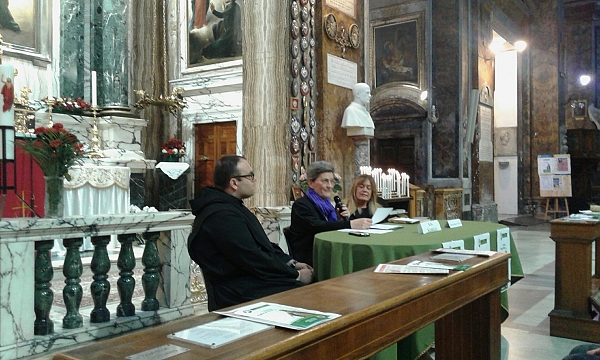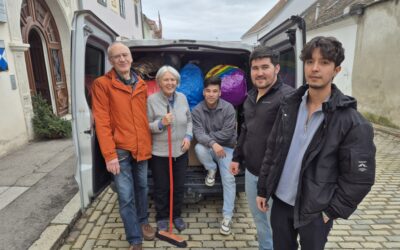 “Merciful Like the Father” is the motto chosen by Pope Francis to summarize what the Year of Mercy is all about. “In mercy,” the Bull of Indiction declares, “we find proof of how God loves us. He gives his entire self, always, freely, asking nothing in return. He comes to our aid whenever we call upon him. (…) And his help consists in helping us accept his presence and closeness to us” (MV, 14). It is this Face of Love-Mercy that fully reveals the Fatherhood of God. God is Love was the inspirational spark that lay at the origins of the charism of unity which the Holy Spirit bestowed on Chiara Lubich in our time (…) Chiara therefore does not show us a God who is far away, inaccessible and foreign to our existence, but a God with a fatherly face (…) So, everything that happens can be seen as the fulfilment of his loving plan for each one of us, as the tangible proof of his watchful care, of his closeness. “Even the very hairs of your head are all counted” (Mt 10:30). This is a fatherly love that anticipates every need, even the smallest, even filling the void left by our small and great imperfections, by our shortcomings and our sins. It is the face of the merciful Father who manifests himself and fully reveals his merciful love through the incarnate Son. Episodes from the Gospel. The magisterial documents that deal with the topic of mercy always cite the Gospel passages that best illustrate it. A classic example is the story of the Prodigal Son (Lk 15:11-32) (…) One day, Chiara found herself talking about this parable in front of a large crowd of young people in the Dome Church of Paderborn, Germany. It was June 12, 1999. Here is what she said to them: “The father of the prodigal son would have had many things to do: Look after the business, the employees, the family; but his main attitude is his longing for the son who had taken off. He goes to the top of the tower of his house and looks out as far as he can see. The Heavenly Father is like this: imagine if you can, dear young people, his divine, most high and dynamic Trinitarian life, how He is constantly engaged in sustaining all creation, in giving a place to those who are going up to Heaven. And yet, above it all, He does one thing especially: He waits. For whom? For us, me, all of you, especially when we find that we’re far from Him. One fine day that son, whom the earthly father loved so much, returned after having squandered everything. The father takes him into his arms and hugs him, covers him in a valuable robe, has the fatted calf prepared for a feast. What must we think? That he longs to see his son all new; he doesn’t want to remember him as he first was. And not only does the father long to forgive him, but even to forget about his past. This is his love for the son in this parable. This is the love of the Father for us in this life: He always forgives us and forgets.” Source: Centro Chiara Lubich Complete text by Alba Sgariglia (Italian)
“Merciful Like the Father” is the motto chosen by Pope Francis to summarize what the Year of Mercy is all about. “In mercy,” the Bull of Indiction declares, “we find proof of how God loves us. He gives his entire self, always, freely, asking nothing in return. He comes to our aid whenever we call upon him. (…) And his help consists in helping us accept his presence and closeness to us” (MV, 14). It is this Face of Love-Mercy that fully reveals the Fatherhood of God. God is Love was the inspirational spark that lay at the origins of the charism of unity which the Holy Spirit bestowed on Chiara Lubich in our time (…) Chiara therefore does not show us a God who is far away, inaccessible and foreign to our existence, but a God with a fatherly face (…) So, everything that happens can be seen as the fulfilment of his loving plan for each one of us, as the tangible proof of his watchful care, of his closeness. “Even the very hairs of your head are all counted” (Mt 10:30). This is a fatherly love that anticipates every need, even the smallest, even filling the void left by our small and great imperfections, by our shortcomings and our sins. It is the face of the merciful Father who manifests himself and fully reveals his merciful love through the incarnate Son. Episodes from the Gospel. The magisterial documents that deal with the topic of mercy always cite the Gospel passages that best illustrate it. A classic example is the story of the Prodigal Son (Lk 15:11-32) (…) One day, Chiara found herself talking about this parable in front of a large crowd of young people in the Dome Church of Paderborn, Germany. It was June 12, 1999. Here is what she said to them: “The father of the prodigal son would have had many things to do: Look after the business, the employees, the family; but his main attitude is his longing for the son who had taken off. He goes to the top of the tower of his house and looks out as far as he can see. The Heavenly Father is like this: imagine if you can, dear young people, his divine, most high and dynamic Trinitarian life, how He is constantly engaged in sustaining all creation, in giving a place to those who are going up to Heaven. And yet, above it all, He does one thing especially: He waits. For whom? For us, me, all of you, especially when we find that we’re far from Him. One fine day that son, whom the earthly father loved so much, returned after having squandered everything. The father takes him into his arms and hugs him, covers him in a valuable robe, has the fatted calf prepared for a feast. What must we think? That he longs to see his son all new; he doesn’t want to remember him as he first was. And not only does the father long to forgive him, but even to forget about his past. This is his love for the son in this parable. This is the love of the Father for us in this life: He always forgives us and forgets.” Source: Centro Chiara Lubich Complete text by Alba Sgariglia (Italian)
Don’t be discouraged by failure
Don’t be discouraged by failure




0 Comments